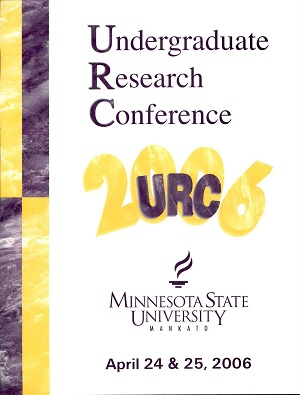Community Assistance for Refugees and Gender Roles: What Could Make this C.A.R. Run Better?
Location
CSU 253
Start Date
25-4-2006 8:45 AM
End Date
25-4-2006 10:15 AM
Student's Major
Anthropology
Student's College
Social and Behavioral Sciences
Mentor's Name
Susan Schalge
Mentor's Department
Anthropology
Mentor's College
Social and Behavioral Sciences
Description
Community Assistance for Refugees is a non-profit service organization in downtown Mankato, Minnesota. Secondary migration to southern Minnesota has increased the refugee population as well as the need for research assessing the needs and concerns of refugees. The purpose of this project was two-fold: first to analyze how C.A.R. is able to meet the needs of its clients and second, to investigate ways in which C.A.R. could improve its services. Traditionally female refugees are less educated and less mainstreamed into American society. This research was designed to help all clients, but special attention was paid to the specific needs of female refugees. By conducting participant observations (volunteering at C.A.R. and recording observations) and ethnographic interviews (semi-structured, open-ended interviews) qualitative data was collected from clients and staff. The majority of clients interviewed were from East Africa and were fleeing violence. Paperwork issues (usually green card or citizenship applications) were the most common reason for client visits to C.A.R. Other client concerns included: language difficulties, discrimination, time management and weather. Staff interviews yielded a glimpse into the struggle of running a successful non-profit service organization. The difficulties and challenges of cross-gender/cross-cultural communication are discussed, as well as suggestions for more effective communication strategies. Finally, conclusions are offered that center on future research options, recommendations to C.A.R. and the Mankato community, and how gender roles have changed for refugees who have came to America.
Community Assistance for Refugees and Gender Roles: What Could Make this C.A.R. Run Better?
CSU 253
Community Assistance for Refugees is a non-profit service organization in downtown Mankato, Minnesota. Secondary migration to southern Minnesota has increased the refugee population as well as the need for research assessing the needs and concerns of refugees. The purpose of this project was two-fold: first to analyze how C.A.R. is able to meet the needs of its clients and second, to investigate ways in which C.A.R. could improve its services. Traditionally female refugees are less educated and less mainstreamed into American society. This research was designed to help all clients, but special attention was paid to the specific needs of female refugees. By conducting participant observations (volunteering at C.A.R. and recording observations) and ethnographic interviews (semi-structured, open-ended interviews) qualitative data was collected from clients and staff. The majority of clients interviewed were from East Africa and were fleeing violence. Paperwork issues (usually green card or citizenship applications) were the most common reason for client visits to C.A.R. Other client concerns included: language difficulties, discrimination, time management and weather. Staff interviews yielded a glimpse into the struggle of running a successful non-profit service organization. The difficulties and challenges of cross-gender/cross-cultural communication are discussed, as well as suggestions for more effective communication strategies. Finally, conclusions are offered that center on future research options, recommendations to C.A.R. and the Mankato community, and how gender roles have changed for refugees who have came to America.
Recommended Citation
Meyer, Nathan E.. "Community Assistance for Refugees and Gender Roles: What Could Make this C.A.R. Run Better?." Undergraduate Research Symposium, Mankato, MN, April 25, 2006.
https://cornerstone.lib.mnsu.edu/urs/2006/oral-session-J/5




